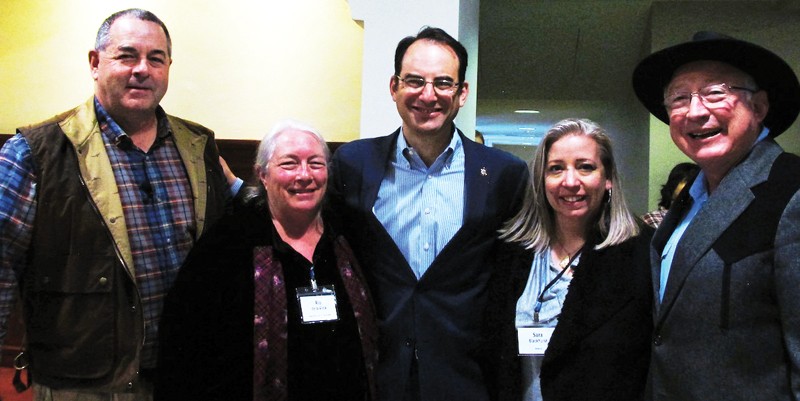‘State of the Basin’ well received

ALAMOSA — Saturday, February 23rd, was an important day for the Rio Grande Basin and Adams State University. The first ever ‘State of the Basin Symposium’ was held at a packed Richardson Hall Auditorium.
Many local water experts were present to share their insights on the Rio Grande Basin’s water situation; however there were a great deal of interested community members that attended as well. Altogether, there was a crowd of approximately 200.
Rio de la Vista, director of the Salazar Rio Grande del Norte Center, opened the event and was thrilled that so many individuals were willing to come. In addition, ASU President Dr. Cheryl Lovell gave a welcome from the university and noted that Adams State is ready and willing to help “address and confront,” the water issues that the Rio Grande Basin is facing.
Former Secretary of the Interior Ken Salazar, and Colorado Attorney General Phil Weiser headlined the keynote address for the event. Salazar noted that he was pleased with how the event highlighted the “importance of the San Luis Valley and rural Colorado.” He also noted that the Rio Grande Basin has “been though a lot of tremendous pain,” when referring to water export proposals and lawsuits of the past. Salazar was also quick to point out that the importance of the San Luis Valley and the Rio Grande Basin is “only going to increase.” He also acknowledged the work of many of the water leaders that were present.
Salazar is also a believer that the Valley is a place where the community can come together and continue to “teach the world” how to solve water issues. He also made reference to the importance of recognizing the integration of water issues in the basin. When mentioning the current water export proposal from Renewable Water Resources, Salazar told the audience to “count me in,” as a citizen that will stand opposed to any such proposal. He also told the story of how the Great Sand Dunes was designated as a national park and how it is a testament to the way the San Luis Valley “has come together.”
He concluded with expressing optimism that the Rio Grande Basin and the Valley can continue to be a strong force and an example for the rest of Colorado.
Weiser opened his remarks by noting the contrast between his story and that of the Salazar family. As a first generation American whose ancestors were refugees of the holocaust, Weiser expressed his appreciation for the strong roots of the Rio Grande Basin calling it the “heart and soul of Colorado.” He expressed his appreciation for the natural beauty of the area. “I have to say, the people are the most impressive part,” he added.
Weiser also noted that there is “nothing like” water policy. He commended the Rio Grande Basin for the work that it has accomplished calling the collaboration he has seen “probably better than anywhere in the world.” He encouraged the audience to “keep this collaboration.” He also acknowledged that Adams State will play an important role going forward. He also stressed the importance of utilizing the “incredible talent” that the Rio Grande Basin has.
Weiser went on to remind the audience that “we have to take care of this place.” He was also optimistic but adamant about the importance of collaboration. “Togetherness has to be true north,” he said. He further noted that “building trust” and a “commitment to innovation,” are necessary for the future of the Rio Grande Basin. He also referred to the importance of optimism noting, “Casting blame doesn’t go well.” Weiser further pointed out that he is mindful of the need for new solutions and acknowledged that the “threat is there,” when it comes to water exportation. He reminded the audience of the economic impact of water saying, “once you sell the water, you’ve just sold your future.”
Weiser concluded that he is “deeply impressed and moved by this Valley.” He expressed his commitment to “manage water the right way and protect this Valley.” Wieser is ready and willing to “solve problems the Colorado way.”



